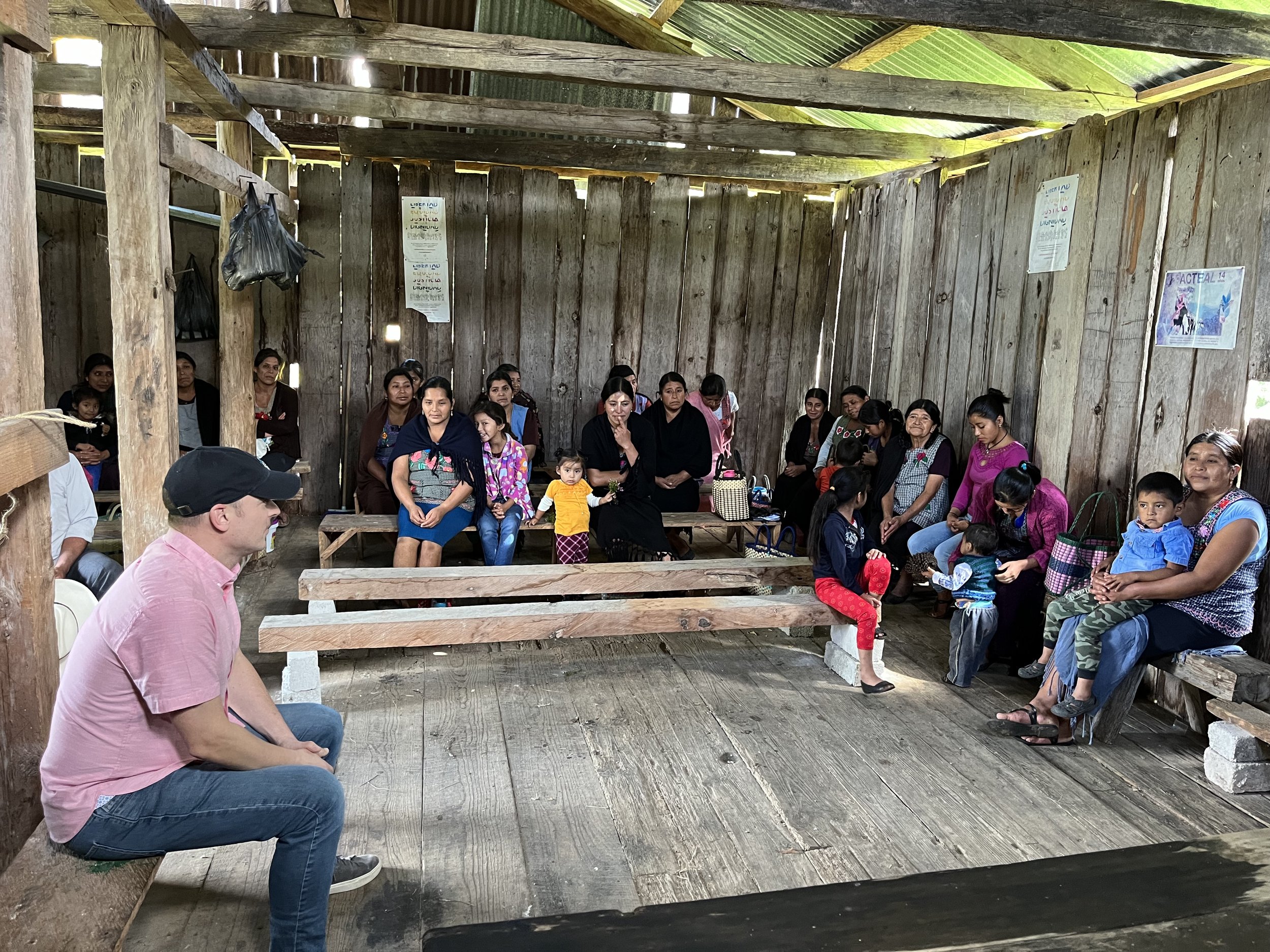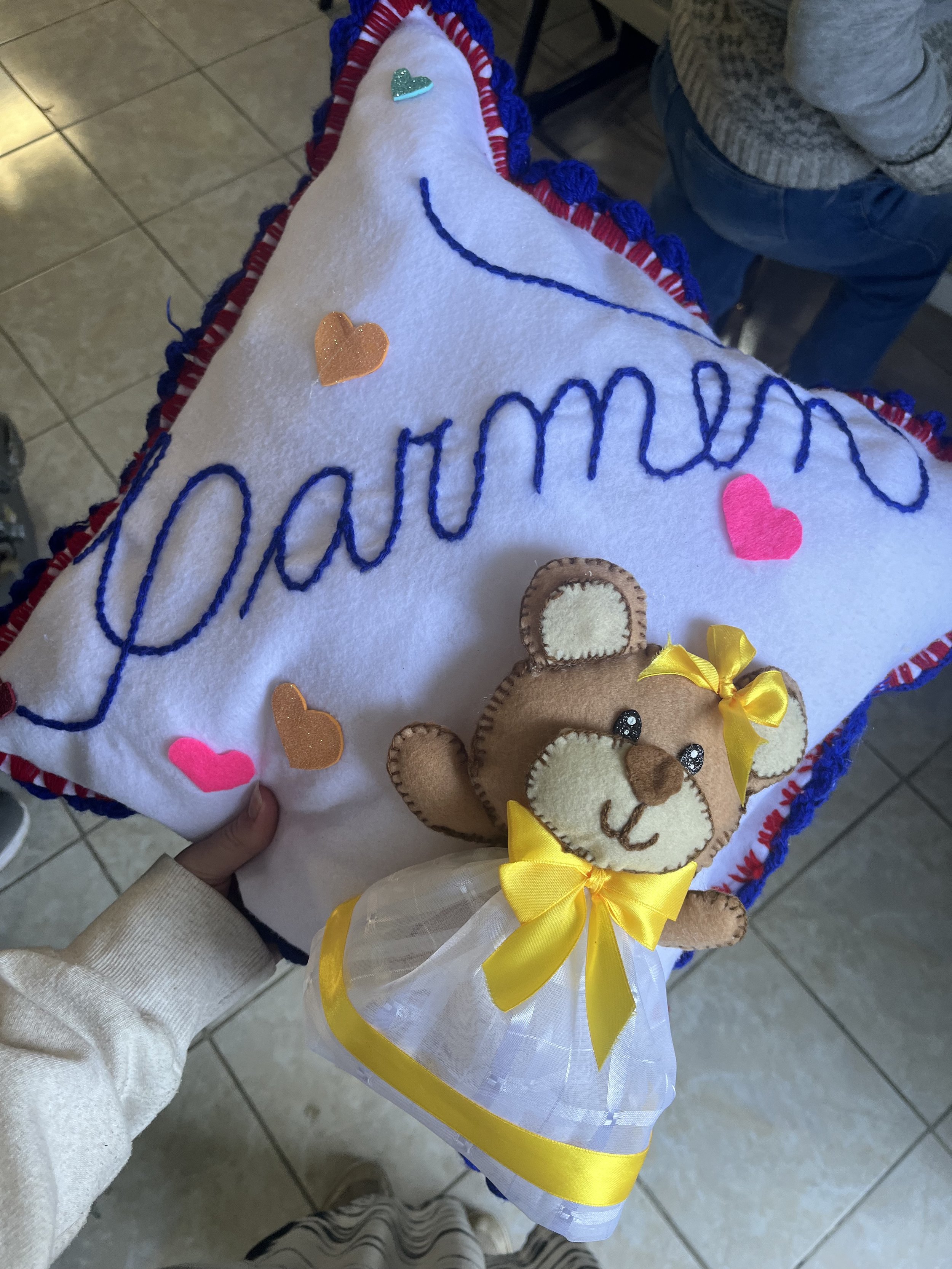Horizons Reconnects with Partners in Central America
From November 27 to December 7th, 2023, Horizons Executive Director Rodrigo Konigs, and fellow staff were able to visit three project partners in Central America and Mexico. It is extremely important to Horizons to make these visits as they foster relationship-building with our project partners and allow us to see the positive impact that your generous donations are contributing to. In these two weeks, we were able to visit our partners DESMI in Mexico, ACUDESBAL in El Salvador, and PIES in Guatemala. We are so excited to share the knowledge that we gained and the experiences that were had.
Supported by DESMI, this community of 110 families, within the municipality of St. Andres has been able to provide youth and students with their own plots of land, educating them on how to grow crops and raise livestock.
Our first visit was with the Economic and Social Development of Indigenous Mexicans (DESMI), a community-based organization that supports marginalized Indigenous communities in Chiapas, Mexico. DESMI was able to organize tours to San Francisco and St. Andres, two different communities currently supported by Horizons. In each community, DESMI helps to build strong, structured collectives with individual community members participating in various roles, including program coordinators and community leaders.
Visiting the community of San Francisco, where 40 families participate in collectives that include animal and agricultural production, the growing of medicinal plants, and creating their own bakery.
Participants in the collective provided us with an overview of various responsibilities, and when asked which one they liked the most, they said “all of them"!
These collectives then have various responsibilities, including educating youth on the importance of sustainable agriculture, environmental protection, growing and harvesting traditional crops and medicinal plants, tending to livestock, and creating stores and bakeries to increase the community's economy. DESMI also collaborated with St. Andres on designing and installing a water pipeline to ensure water is accessible to homes in the dry season. As these are independent communities, they do not receive government support, therefore, collaborating with DESMI is vital for the sustainability of these communities and their traditional practices.
Our second flight took us to El Salvador, where Horizons was able to meet with The Intercommunity Association of Communities Working Together for the Economic and Social Development of Lower Lempa (ACUDESBAL), a community organization founded by former refugee families after the destruction of Hurricane Mitch (1998) to coordinate relief and reconstruction efforts in the Lower Lempa region of El Salvador.
Horizons has been working with ACUDESBAL since 2007. Rodrigo Konigs (left) and the Executive Director of ACUDESBAL, Mario (Right).
Horizons currently supports ACUDESBAL with a project that has a primary focus on risk management and prevention in the area of climate change, as this location in El Salvador is prone to flooding and climate disasters. Within this project, ACUDESBAL has formed a collective consisting of 10 communities in which participants are educated on what to do when a natural disaster occurs and are provided with training on first aid, shelter management, and logistics.
Participants in the community who are a part of the collective, and have experienced many tropical storms themselves, discuss with Horizons the importance of ACUDESBAL and how the creation of these collectives has increased knowledge on climate change and disaster relief measures.
Currently in El Salvador, the government does not prioritize providing support for this community and has dismantled the disaster relief management system that used to be in place previously. ACUDESBAL has taken this gap in support and worked with the community to create disaster management coordination units and has provided a space for dialogue on the effects of climate change and natural disasters.
In Central America and Mexico, a soccer field is more than just for sport. It is a place to celebrate and play, provides youth an outlet that does not lead to violence, and becomes the heart and spirit of every community. An exciting stop in our journey was visiting the soccer field that donations like yours helped to build!
Our third visit was with The Association for Health Promotion, Research, and Education (PIES), founded in 1994 to address the health challenges facing Indigenous people in Guatemala. Currently Horizons’ biggest project, PIES advocates for young, female survivors of sex trafficking and sexual violence ages 12-17, who are living in government-run shelters. In a situation of violence and abuse, these youth are removed from their homes for their protection and placed into government-run shelters by the court system until their case is closed. Once in the shelter, PIES helps to provide these young girls with individualized, trauma-informed care that is rooted in warmth, patience, and cultural safety.
PIES helps to provide these girls with individualized education plans as most young girls have never received any form of formal education. PIES provides them with life skills classes that include sewing, cosmetics, hair styling, and jewellery making in hopes that these skills can be used as income support when they leave the shelter.
Unfortunately, this shelter is over capacity by 80%, which is almost double what they are able to support. Currently, there are 154 girls residing at the shelter, including 53 babies ages 0-4. Horizons will continue to support in this project as this will allow for infrastructure to be updated and maintained, and growing pressures on the shelter to be reduced.
Young mothers who are survivors of sexual abuse share a room with each other and their children, while those who are survivors of abuse but do not have children live separately.
Another primary goal for PIES is to increase education on sexual and reproductive health not only for the youth that enter the shelter but also for university students who become future doctors, teachers, psychologists, and social workers. PIES collaborates with universities to promote programming and awareness of violence against women, allowing individuals enrolled in these university programs to gain awareness of the situational context of young girls and be provided with the tools they need to address their mental, physical, and emotional needs. These students are then able to identify various forms of trauma, support those who experience violence with empathy and compassion and become empowered to know how to advocate for the rights and protections of all people.
PIES creates educational materials shown above, that focus on sexual and reproductive health, healthy relationships, the reproductive system, and how your body changes during pregnancy.
It’s been such an incredible experience meeting so many passionate community leaders, volunteers, advocates, and project coordinators who are making such a difference in these communities.. Horizons is excited to show just how donations like yours play such a vital role in ensuring communities, children, Indigenous populations, migrants, and adolescents in Central America and Mexico who face a need are supported and continue to be strengthened.
At Horizons, we value each and every donation, and we will continue to prioritize sharing project updates from the partners, communities, and the people that your donations support. Step by step, and donation by donation, we will continue to fight for social justice and equality in Central America, Mexico, and Ontario. You can look out for more updates on this trip in our next newsletter!
From all of us at Horizons of Friendship, we thank you, and we wish you Happy Holidays and blessings in the new year. ¡Feliz Navidad!










